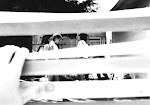
I've been thinking about the mystique of the books you read as a child. Not necessarily great, prize-winning classics, but books that somehow or other spoke to you, books you remember for sometimes very peculiar or trivial reasons. I've just been looking through the archives at Loganberry Books'
Stump the Bookseller site, where you can post memories of books you read once whose titles you no longer recall. Technically you can post any book, but the majority of the posts are for children's books, and the posters say over and over things like "...I've been searching for this book for 30 years." And the things they remember about the book -- the cover, of course, an illustration, a particular plot twist, a word or phrase! It's a huge testament to how much books are loved and remembered, how they become part of people's lives.
I used Stump the Bookseller a couple years ago to find two historical novels which I read multiple times as a teen. I can credit both of them with developing my interest in certain historical subjects. For the first one, all I remembered is that the heroine was a girl in the World War I era who falls in love with a boy who is the town outcast because he has a German name. The boy's name, Paul, had stuck with me all these years, as did a scene where some townspeople threw stones at a dauchshund because it was a German dog.
This turned out to be Norma Johnston's
A Nice Girl Like You, which was published in 1980, and was part of a series that Johnston wrote about the various members of a extended family in Westchester County, New York. But I'd actually conflated part of it with another book,
Never Jam Today by Carole Bolton, about a girl who takes part in the women's suffrage movement. What I loved about
A Nice Girl Like You was the Romeo-and-Juliet romance between Saranne and Paul, who was the classic "bad boy." And
Never Jam Today gave me a picture of the World War I era as a time of change, with protest marches, an anti-war movement and new technologies. ("You can fly from New York to San Francisco in only four days," someone says to the heroine, who replies, "Why would I want to do that?")
The second book I remembered well was set in 19th century Russia and was about a girl who is sent to a boarding school for orphaned daughters of Army officers. She's unhappy at first, but eventually makes friends, and then the Neva river floods and the girls have to be rescued. Later she becomes a lady in waiting at the Tsar's court and is involved in the
Decemberist Revolution. I remembered certain aspects with crystal clarity -- the girl's father was killed at something called the Battle of Borodino (they didn't teach the Napoleonic wars in Kentucky) and that she had friend called Sonia who was sent into exile with her Decemberist fiance.
I don't know how many times I read this book as a child, but I can honestly say that it possessed me. I identified entirely with the heroine. As an adult it was THE book I thought of when I remembered my childhood reading. (Like many of the posters on Stump the Bookseller, I remembered almost exactly what section of the library it was in.) However, I'd completely forgotten the title and probably never paid any attention to the author. Fortunately, when I posted the description someone had an answer right away:
Masha, published in 1968 by a writer named
Mara Kay. (There was actually a sequel -- I'd remembered it as being all one book -- called
The Youngest Lady in Waiting, and that was the one about the Decemberist Revolution.)
Given that how big these books were for me as a teenager, I thought it might be fun to re-read them. I tracked down
A Nice Girl Like You and
Never Jam Today easily, and...well, I was kind of surprised and disappointed. The great romance of Saranne and Paul was mainly in my head: the book underplays it and they hardly even kiss.
Never Jam Today turned out to be one of those historical novels where various facts are kind of shoveled awkwardly into the text. The dialogue was stilted and the characters' motivations were thin.
I can't believe I didn't notice these things as a teenager, and yet perhaps it didn't matter. I'd like to think great writing lasts and poor writing fades. But Stump the Bookseller is testament to the fact that sometimes readers love books in spite of themselves. Sometimes a book just sparks something in you, opening your eyes to a new world, in spite of problems with plot, structure and dialogue.
As for
Masha, I can't tell you if it's a disappointment or not, as it is now a "rare" book and the cheapest copy I could find was more than $300! I guess it's better that way. At least I won't ever lose my memories of it.


















